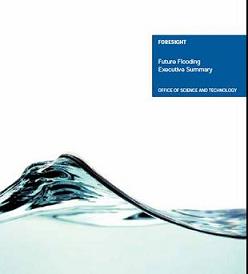Foresight project, UK
This article presents an overview of a major UK study: The UK Foresight Flood and Coastal Defence Project (2004). It summarises the aims and scope of the project, the key messages and the recommendations for future research.
Contents
The aim of the project
To use the best available science to provide a challenging vision for flood and coastal defence in the UK between 2030 and 2100 and so inform long-term policy.
A broad scope:
The work covers all of the UK and looks at flooding from rivers and the sea, as well as internal flooding in towns and cities. It also considers the risks of coastal erosion.
Sustainability analysis at the heart:
We have looked at economic, social and environmental consequences.
Foresight Key messages
•If we continue with existing policies, in virtually every scenario considered, the risks grow very substantially.
•The risks need to be tackled across a broad front. Reductions in global emissions would reduce the risks greatly. However, this is unlikely to be sufficient. Hard choices need to be taken - we must either invest more in sustainable approaches to flood and coastal management or learn to live with increased flooding.
Foresight Recommendations for Coastal Research
Waves
More research is required to improve understanding of how climate change may influence the offshore wave regime in terms of magnitude, frequency and, importantly, direction. This should include analysis of a range of climate models and be combined with analysis of changes to surges to generate consistent scenarios. To be of most use, this needs to be at a resolution that identifies variations around the coast.
Surges
Given the large uncertainty for this driver, and its potential significance in terms of increased flood risk, it is important that it receives further research. The limited number of model runs of future surge characteristics needs extending, with an emphasis on extreme events and a better analysis of the natural variability of surges versus the magnitude of climate change. More fundamentally, the conflicting results from different climate models need more detailed comparison and analysis to study the causes of these differences. This should be combined with analysis of the Waves driver to develop consistent changes across drivers, and establish a range of better scenarios.
Relative Sea-Level Rise
Planning for sea level rise would benefit greatly from probabilistic forecasts for future sea levels, as opposed to the scenarios presently available. This work should include the probability of all the three components of sea level rise and will require a better understanding of the causes of the spatial pattern of change due to meteo-oceanographic factors.
Coastal Morphology and sediment Supply
Our ability to predict changes in this driver is hampered by a lack of good long-term data sets. Thus it is difficult to observe long-term trends and to calibrate and validate long-term models with accuracy. In addition, there are uncertainties in determining the behaviour of coastal morphology beyond that observed in the data. Research agenda designed to overcome this would prove invaluable.
Further details
http://www.foresight.gov.uk/Previous_Projects/Flood_and_Coastal_Defence/
Please note that others may also have edited the contents of this article.
|
